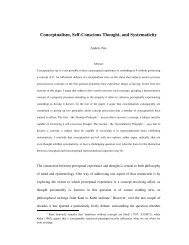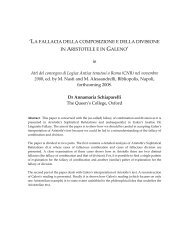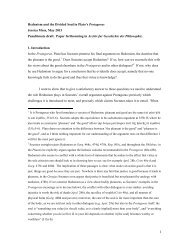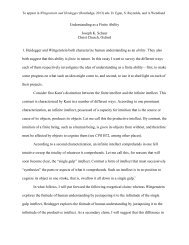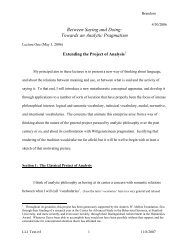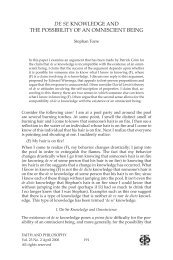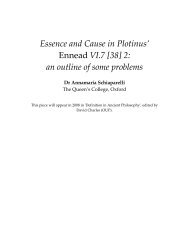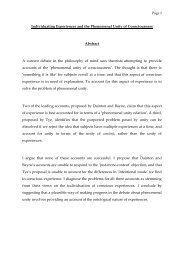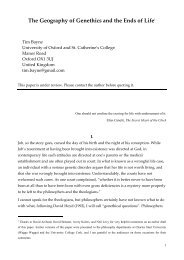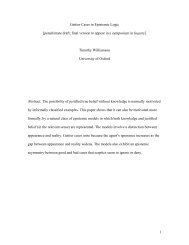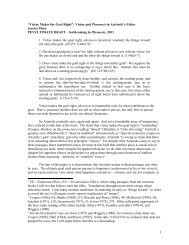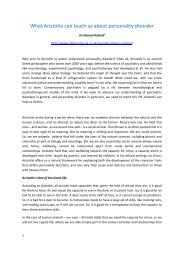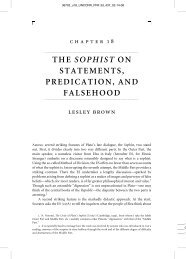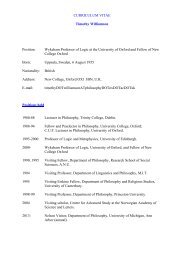Say who everyone is as you go along - Faculty of Philosophy ...
Say who everyone is as you go along - Faculty of Philosophy ...
Say who everyone is as you go along - Faculty of Philosophy ...
You also want an ePaper? Increase the reach of your titles
YUMPU automatically turns print PDFs into web optimized ePapers that Google loves.
26<br />
He means the remedy for pessim<strong>is</strong>tic thought and negative emotions <strong>is</strong> severe<br />
suffering. Much mental torment comes from what Nietzsche regards <strong>as</strong> a tacit<br />
background <strong>as</strong>sumption <strong>of</strong> most <strong>of</strong> our daily life:<br />
'"ex<strong>is</strong>tence <strong>is</strong> something evil"' (GS 85)<br />
To put it less dramatically, many human beings treat their lives <strong>as</strong> a problem. It <strong>is</strong> an<br />
important part <strong>of</strong> Zen not to treat life <strong>as</strong> a problem. The main problem in life ar<strong>is</strong>es<br />
from <strong>as</strong>suming that life <strong>is</strong> a problem. If we ce<strong>as</strong>e to treat life <strong>as</strong> a problem it largely<br />
ce<strong>as</strong>es to be a problem.<br />
The practice <strong>of</strong> the kind <strong>of</strong> Buddh<strong>is</strong>t meditation called za-zen h<strong>as</strong> <strong>as</strong> one <strong>of</strong> its aims<br />
the elimination <strong>of</strong> torturing thoughts. We may understand th<strong>is</strong> on different levels. Zazen<br />
allows one to think the thoughts one w<strong>is</strong>hes to think, rather than being simply<br />
'subject to' thoughts. Th<strong>is</strong> <strong>is</strong> by no means a licence for w<strong>is</strong>hful thinking, which <strong>is</strong> an<br />
obstacle to Zen. It <strong>is</strong> obtaining control over the contents <strong>of</strong> one's own mind. Za-zen<br />
also allows an emotional detachment from one's thoughts. Although in meditation<br />
thoughts may ar<strong>is</strong>e and subside, they are permitted to ar<strong>is</strong>e and subside,<br />
d<strong>is</strong>p<strong>as</strong>sionately. Finally, in za-zen there <strong>is</strong> reached a point when there are no<br />
thoughts, only empty but alert awareness. Nietzsche says<br />
'[...] worst <strong>of</strong> all are petty thoughts. Truly, better even to have done wickedly than to<br />
have thought pettily!' (Z 113)<br />
A Zen Buddh<strong>is</strong>t would find th<strong>is</strong> an exaggeration. The karmic effects <strong>of</strong> evil deeds are<br />
far more seriously detrimental than the thinking <strong>of</strong> petty thoughts. Nevertheless, the<br />
Zen Buddh<strong>is</strong>t would agree that a life spent thinking petty thoughts <strong>is</strong> a life w<strong>as</strong>ted in<br />
a kind <strong>of</strong> mental impr<strong>is</strong>onment; a daily impr<strong>is</strong>onment in the tormenting contents <strong>of</strong><br />
one's own mind.<br />
Nietzsche recogn<strong>is</strong>es something akin to karma when he says<br />
'The evil deed <strong>is</strong> like a boil: it itches and irritates and breaks forth - it speaks<br />
honourably. (Z 113)<br />
Guilt, shame, and bad conscience are consequences <strong>of</strong> an evil deed that are <strong>as</strong> hard to<br />
escape <strong>as</strong> the d<strong>is</strong>comfort <strong>of</strong> a physical boil. Nietzsche contr<strong>as</strong>ts the evil deed with the<br />
petty thought:<br />
'But the petty thought <strong>is</strong> like a canker: it creeps and hides and wants to appear<br />
nowhere. (Z 113)<br />
Buddh<strong>is</strong>m recogn<strong>is</strong>es that our thoughts hide. Our minds trick us. We find ourselves<br />
thinking about something even (or especially) when we have decided not to think



